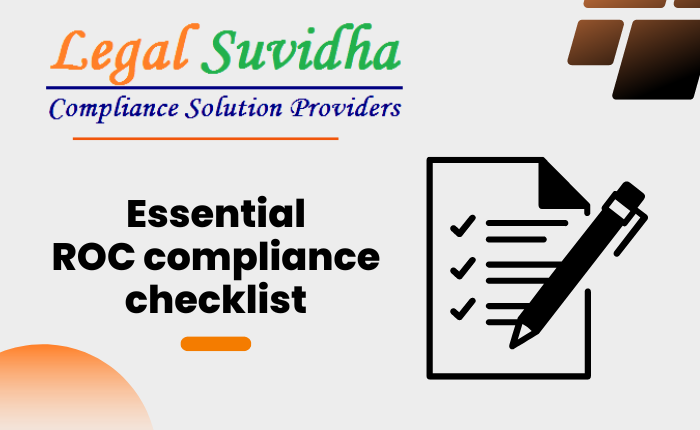In the fast-paced world of business, adhering to regulations and compliance standards is crucial for sustainable growth. Regulatory compliance ensures that companies operate within legal boundaries, fostering transparency, trust, and accountability. One such essential compliance framework is the ROC (Registrar of Companies) Compliance. In this article, we present a comprehensive ROC Compliance Checklist that covers all the crucial aspects to help your business navigate the regulatory landscape successfully.
Understanding ROC Compliance
Before delving into the checklist, let’s understand what ROC Compliance entails. The Registrar of Companies (ROC) is a governmental body responsible for maintaining records of companies registered within a jurisdiction. ROC Compliance refers to the adherence of companies to the regulations and norms prescribed by the Companies Act, ensuring accurate and up-to-date records.
Importance of ROC Compliance
Maintaining ROC Compliance is not just a legal requirement; it’s a reflection of a company’s commitment to transparency and accountability. It instills investor confidence, facilitates easier access to capital, and prevents legal issues that could hinder business operations.
Key Checklist Items
1. Company Registration: Ensure your business is appropriately registered with the ROC, following the prescribed procedures and submitting the necessary documents.
2. Annual Returns: File annual returns within the stipulated time frame, disclosing key financial and operational information.
3. Financial Statements: Submit accurate financial statements, including balance sheets, profit and loss statements, and cash flow statements.
4. Board Meetings: Hold regular board meetings and maintain minutes to document important decisions and discussions.
5. Shareholder Meetings: Conduct annual general meetings (AGMs) to discuss financial performance, appoint directors, and address shareholder concerns.
6. Director’s Report: Prepare a comprehensive director’s report that outlines the company’s activities, financial performance, and future plans.
7. Appointment and Resignation of Directors: Notify the ROC about director appointments and resignations within the stipulated time.
8. Changes in Share Capital: Inform the ROC about any changes in the company’s share capital structure.
9. Statutory Registers: Maintain updated statutory registers containing information about shareholders, directors, and other key personnel.
10. Disclosure of Interest by Directors: Directors must disclose their interests to other entities to prevent conflicts of interest.
11. Related Party Transactions: Properly disclose and document transactions with related parties to ensure transparency.
12. Filing of Charges: If the company takes loans or mortgages, register these charges with the ROC.
13. Compliance Officer: Appoint a compliance officer responsible for overseeing ROC compliance activities.
14. Annual Audit: Conduct an annual audit of the company’s financial statements by a qualified auditor.
15. Penalty Avoidance: Avoid penalties by adhering to filing deadlines and compliance requirements.
16. Registered Office: Maintain a valid registered office and update ROC about any changes.
17. ESOP Reporting: If the company offers employee stock options, ensure accurate reporting to the ROC.
18. Investor Grievances: Address and resolve investor grievances promptly and transparently.
19. Trademark Renewal: Renew trademarks within the prescribed time to protect intellectual property rights.
20. GST and Tax Compliance: Ensure timely payment of GST and other taxes.
21. Digital Signature Certificates (DSCs): Obtain and maintain valid DSCs for authorized signatories.
22. Insider Trading Compliance: Educate directors and employees about insider trading regulations.
23. Data Protection: Comply with data protection regulations, safeguarding sensitive information.
24. Foreign Investment Reporting: Report foreign investments as per government guidelines.
FAQs
1. What Is ROC Compliance?
ROC Compliance refers to adhering to regulatory norms outlined by the Registrar of Companies, ensuring accurate record-keeping and transparency.
2. Why Is ROC Compliance Important?
ROC Compliance is essential for building trust, ensuring legal compliance, and maintaining a smooth business operation.
3. What Are Annual Returns?
Annual returns are documents containing financial and operational information that companies must file with the ROC each year.
4. Can Small Businesses Ignore ROC Compliance?
No, ROC Compliance is mandatory for all registered companies, irrespective of their size.
5. What Are the Director’s Report and Board Meetings?
The director’s report outlines company activities, while board meetings discuss key decisions. Both are crucial for transparency.
6. How Can I Prevent Penalties?
Adhere to filing deadlines, maintain accurate records, and promptly address compliance requirements.
Conclusion
Navigating the regulatory landscape can be complex, but with the comprehensive ROC Compliance Checklist, you’re equipped to ensure seamless adherence to compliance standards. By following these guidelines, your business can thrive with transparency, trust, and a strong foundation for growth.
If You have any queries then connect with us at [email protected] or [email protected] & Contact us & stay updated with our latest blogs & articles


![Founder Shareholding: 5 Critical Mistakes That Kill Fundraises [2026 Guide] 1 Founder Shareholding](https://legalsuvidha.com/wp-content/uploads/2026/01/unnamed-file-2.png)
![Received an Income Tax Notice in India? Don’t Panic — Here’s Exactly What to Do [2025 Guide] 2 Income Tax Notice](https://legalsuvidha.com/wp-content/uploads/2025/12/Income-Tax-Notice.png)
![Cyber Crime FIR in India: How to File Complaint for Online Fraud, Banking Fraud & Digital Harassment [2025 Guide] 3 Cyber Crime Complaint](https://legalsuvidha.com/wp-content/uploads/2025/12/Cyber-Crime-Complaint.png)
![Trademark Infringement in India: How to File Legal Action & Protect Your Brand [2025 Guide] 4 Tradenark Infrigement](https://legalsuvidha.com/wp-content/uploads/2025/12/Tradenark-Infrigement.png)



